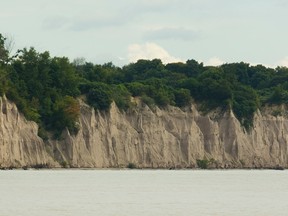Concerned stakeholders say more consultation needed on Lake Erie shoreline erosion plan

Article content
Lake Erie landowners irritated by erosion are urging Elgin county and regional conservation authorities to take action – after the release of a report that recommends letting nature take its course.
The Lake Erie North Shore Landowners' Association (LENSLA) was officially formed in January after the Catfish Creek, Kettle Creek, Long Point Region and Lower Thames Valley conservation authorities adopted a new plan that casts doubt about the effectiveness of man-made erosion intervention along the shoreline.
The report, a joint venture funded by four regional conservation authorities and the County of Elgin, was drafted as a response to an ages-old problem along the Lake Erie's north shore. Parts of the 90 kilometre stretch in Elgin county are threatened by rapid erosion that would be expensive and difficult to slow or stop.
Among other details, the Elgin County Shoreline Management Plan advises fighting coastal recession with man-made fixes is not only cost-prohibitive, but futile. The study authors, Ottawa-based engineering firm W.F. Baird and Associates Coastal Engineers, propose a so-called "managed retreat" policy for the affected areas along the north shore of Lake Erie.
Since retaining the coast by any means necessary is not the goal, the management plan will prevent some landowners from erecting their own erosion barriers on their properties – something LENSLA is deeply concerned about.
"They just want us to walk away and take our houses with us," said Kyle Cronk, president of LENSLA and landowner along the high bluffs east of Port Stanley.
"I can't do erosion control so nobody is going to buy my property. I have to sit here and watch my house fall into the water or I have to remove it ... I have a $400,000 piece of property here that basically has a value of zero."
Though many landowner in high-risk areas are not permitted to take erosion control into their own hands, the 166-page plan does recommend "bio-engineering techniques to manage surface water, absorb soil moisture, and increase slope stability" and planting native vegetation to slow land losses.
In the coming weeks, LENSLA will be meeting with representatives from the authorities and the technical staff who worked on the report to discuss their concerns.
“We're interested in working with any affected landowners to see how their interests can be accommodated,” said Don Pearson, general manager of the Lower Thames Valley Conservation Authority.
“But at the same time we are responsible for administering provincial policy as it relates to shoreline hazards.”
Pearson said the report takes into account projected erosion over the next century and gives the authorities and county a tool to plan accordingly for future development.
Pearson was quick to point out the plan doesn't call for an outright ban on erosion measures in every area along the coast. Instead, properties would be assessed on a case-by-case basis and any erosion intervention would need to take neighbouring properties and the overarching goals of the plan into account.
LENSLA represents 42 landowners from across Elgin county who will be directly affected by the conservation authorities' new mandate. The report delves into the costs associated with erosion prevention relative to the value of the land at risk.
"According to their plan, the value of the property ... is around $34 million. And what the conservation authorities want to do is let that fall into the lake," said Cronk, whose 1.6 hectare property along Dexter Line is under imminent threat of erosion damage.
The organization is calling on the conservation authorities to suspend the report's recommendations and is asking the regulatory bodies involved to draft a better plan with more public input and respect for landowners' rights. The community organization also said more expert opinions should be included in the management plan.
Earlier in January, only months after accepting the final report, the Long Point Regional Conservation Authority (LPRCA) board voted to defer implementation of the study's recommendations after hearing from concerned stakeholders.
"They felt that there needed to be more consultation, which is fair," said Cliff Evanitski, general manager and secretary treasurer of the LPRCA.
"While it is an update of an existing plan, it is a big issue and so they felt they wanted more input. I think the board felt it was a fair enough request ... Obviously you want to give people the best opportunity to learn more about it and have their say," he said.